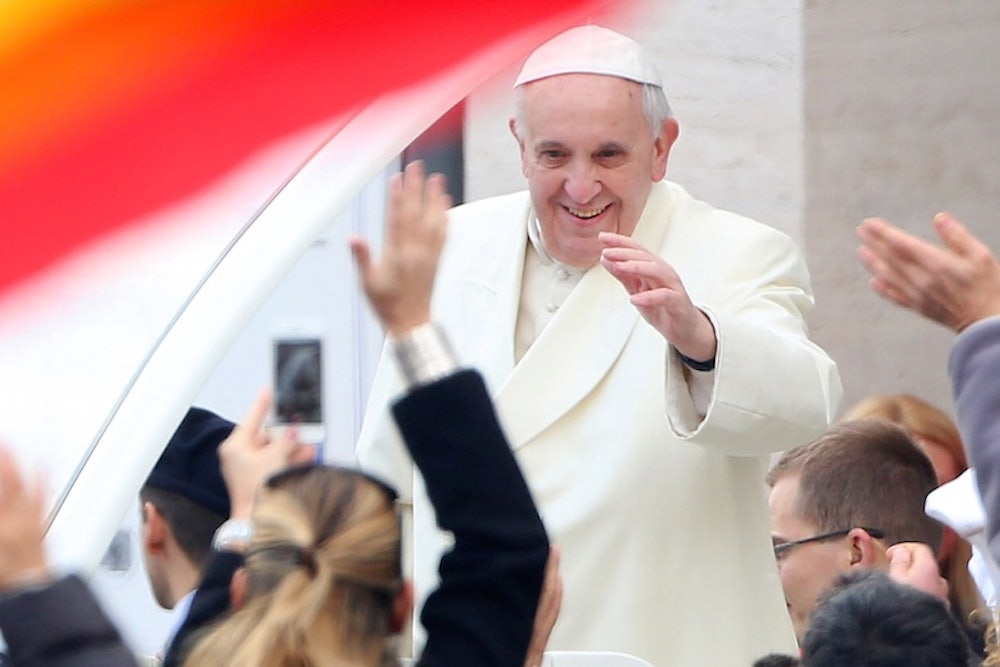News broke Friday that Pope Francis met privately with his old friend Yayo Grassi—a gay Argentinian man—and his longtime partner last week at the Vatican Embassy in Washington. The meeting came a day before the pontiff had a brief encounter with Kim Davis, the Kentucky county clerk who was jailed for refusing to issue marriage licenses to gay couples. Which raises the question, Who didn’t secretly meet with the Pope during his trip to the United States?
These dual encounters have confounded those who try to fit Pope Francis within the narrow framework of American politics, but makes perfect sense for a Pope whose values are rooted in the Gospel of Jesus Christ and not in stateside political ideologies. As John Carr, director of Georgetown University’s Initiative on Catholic Social Thought and Public Life, recently told me, “The United States might be the center of our universe, but it isn’t the center of Francis’s universe.”
It’s worth noting that both meetings were intended to be private, and as the Vatican made clear on Friday, none of the Pope’s private encounters were meant to suggest Francis’s support for people’s beliefs or actions. Regarding the Kim Davis meeting, Vatican spokesman Rev. Federico Lombardi said that “the Pope did not enter into the details of the situation of Mrs. Davis, and his meeting with her should not be considered a form of support of her position in all of its particular and complex aspects.”
What’s unfortunate about this past week’s drama is that it has overshadowed the fact that since Jorge Mario Bergoglio became Pope Francis in March 2013, he has undergone a significant public transformation on same-sex marriage and other LGBT issues.
In fact, the transformation began several years before. In 2010, when Argentina was debating legalizing same-sex marriage nationwide, then-Cardinal Bergoglio worked in the background to provide a pragmatic alternative to the same-sex marriage legislation. But he presented a distinctly different disposition in public. In an open letter to nuns that was released days before the vote, he wrote:
In the coming weeks, the Argentine people will face a situation whose outcome can seriously harm the family.
At stake is the identity and survival of the family: father, mother and children. At stake are the lives of many children who will be discriminated against in advance, and deprived of their human development given by a father and a mother and willed by God. At stake is the total rejection of God’s law engraved in our hearts.
Let us not be naive: This is not simply a political struggle, but it is an attempt to destroy God’s plan. It is not just a bill (a mere instrument) but a "move" of the father of lies who seeks to confuse and deceive the children of God.
Yayo Grassi was disturbed by his longtime friend’s harsh words. As he recounted earlier this summer for National Geographic, after seeing Bergoglio’s letter, he immediately e-mailed the future Pope, writing: “You have been my guide, continuously moving my horizons—you have shaped the most progressive aspects of my worldview. And to hear this from you is so disappointing.”
Here’s how National Geographic described Bergoglio’s response:
The archbishop responded by email—though no doubt providing a handwritten draft in his tiny script to his secretary, as Pope Francis, then and now, has never been on the Internet, used a computer, or even owned a cell phone. … He began by saying that he had taken Grassi’s words to heart. The Catholic Church’s position on the subject of marriage was what it was. Still, it pained Bergoglio to know that he had upset his student. Grassi’s former maestrillo assured him that the media had badly misconstrued his position. Above all, said the future pope in his reply, in his pastoral work, there was no place for homophobia.
Fast forward to 2013, months after Bergoglio was elected the Bishop of Rome, and something had changed in his public demeanor on the issue. In July that year, after his first trip overseas for World Youth Day in Brazil, Francis said in a press conference on the plane ride home: “If a person is gay and seeks God and has good will, who am I to judge?”
That was followed by an interview with America Magazine several months later, in which he called on the Church to become less obsessed with abortion, same-sex marriage, and contraception. Asked in the interview how he responded to difficult questions regarding homosexuality, he said:
A person once asked me, in a provocative manner, if I approved of homosexuality. I replied with another question: ‘Tell me: when God looks at a gay person, does he endorse the existence of this person with love, or reject and condemn this person?’ We must always consider the person. Here we enter into the mystery of the human being. In life, God accompanies persons, and we must accompany them, starting from their situation.
Francis’s desire to encounter the LGBT community has been evident since. Earlier this year, he embraced a transgender Catholic man who had felt excluded from his parish and met with a prominent gay marriage activist in Paraguay.
So is Pope Francis “evolving” on gay marriage? Not in the way President Barack Obama or other politicians have. Don’t expect Francis to come out in support of gay marriage anytime soon. But clearly his tone on LGBT issues is changing—and in the Catholic Church, where teaching rarely changes, tone is everything.
